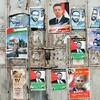
Barghouthi detained for over 2 hours in Jerusalem on last day of presidential campaign
7 January 2005
Palestinian Presidential Candidate Dr. Mustafa Barghouthi detained for over two hours in East Jerusalem on the last day of the presidential campaign. Barghouthi visited East Jerusalem on the last day of the presidential campaign. He met with President Jimmy Cater at the Seven Arches Hotel in East Jerusalem. He told President Carter that he was going to the Old City to attend Friday prayers at the al-Aqsa Mosque. President Carter indicated that if he got arrested he should let him know. He did not take this seriously, as he had a permit to enter Jerusalem up till 2 pm that afternoon. The permit, furthermore, does not specify places Dr. Barghouthi is not ‘allowed’ to visit. Read more about Barghouthi detained for over 2 hours in Jerusalem on last day of presidential campaign








